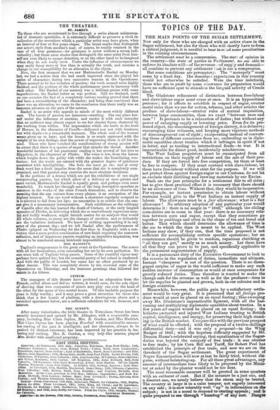THE THEATRES.
ST. JAKE8'S.
To those who are accustomed to live through a series almost uninterrup- ted of dramatic spectacles, it is extremely difficult to preserve a vivid re- collection of the sensations which a particular artist may have given, when an interval of four or five years elapse. The broad marks that distinguish one actor's style from another's may, of course, be readily retained in the case of all true greatness—for greatness is never without a strong indi- viduality; but those nicer shades that distinguish the same artist from him- self are ever likely to escape detection, or on the other hand to be imagined when they do not really exist. Under the influence of circumstances we may easily fancy more or less than is actually the truth, and mistake a change in our susceptibility for an alteration in the object.
Now, the first moment that we saw Mademoiselle Rachel on Monday last, we had a notion that she had much improved since she played her series of characters during two successive seasons at the Operahouse. There seemed to be less isolation of passion; the work seemed more highly finished, and the portions of the whole performance more in harmony with each other. The Rachel of our memory was a brilliant genius with some imperfections; the Rachel before us was perfect. Still we doubted, until on one occasion the fact of a completely various reading proved that there had been a reconsidering of the character; and being thus convinced that there was an alteration, we came to the conclusion that there really was an immense advance on the part of the actress.
Rachel is an artist who appeals to minds of the most widely different cast. The bursts of passion are immense—startling. She can place her- self under the influence of emotion, and render it with such intensity that an audience may almost expect to see her slender frame shattered by the working from within. The imprecation which she hurls at the head of Horace, in the character of Camille—delivered now not with loudness, but with depth—is a remarkable instance. The whole soul of the woman seems given up to hate; and the bosom is so much oppressed with the weight of its own feelings, that the power of expressing them is all but de- nied. Those who have watched the manifestations of strong passion will hilaware that there is a species of anger that attacks the throat. Another wonderful instance of her passionate reading is her avowal of her love to Hippolyte, in the character of Phidre. The voice is low, from the horror which weighs down the guilty wife while she makes the humiliating con- fession; but the words are uttered with the greatest degree of quickness consistent with intelligibility. She feels she must go on; and at every fresh word has a fresh impulse from the sense that she is completely com- promised, and that passion may exercise the most absolute dominion. In the portions of a drama which are not the exhibitions of one single overpowering passion, but which allow of a delivery at once quieter and more varied, Mademoiselle Rachel is equally great, and perhaps even more wonderful. To watch her through one of the long descriptive speeches so common in the works of the elder French dramatists, and to observe the meaning that she can extract from every phrase, is an occupation of the highest interest. Not one word without a character regularly assigned to it is allowed to fall from her lips; no conception is so snbtile that she can- not give it a momentary interpretation. Such exhibitions as the soliloquy of Camille after she has learned the death of Curiace, or the early languid speeches of Phbdre, in delivering which she so marvellously represents men- tal and bodily weakness, might furnish matter for an analysis that would fill whole columns, so many are the changes of emotion, and so delicately are the variations indicated. We know of nothing approaching it in any actor of the present day; and we left Rachel after the performance of Phedre (played on Wednesday for the first time in England) with .a con- viction that a more perfect combination of rare finish requiring the matureat reflection, and of impetuous passion requiring an impulsive inspiration, was almost to be numbered among histrionic impossibilities.
HER MAJESTY'S.
Taglioni's reappearance is the great event at the Operahonse. She comes with all her fascinations, even concealing her art by its own perfection. No one must talk of Taglioni being passee. Some of the youthful vigour may perhaps have quitted her, but the essential poetry of her school is unaltered. And with the public of London her name has an effect produced by no other dancer. This was completely shown by the crowded state of the Operahouse on Thursday, and the immense greetings that followed her entrée in La Gitatuz.
LYCEUM.
The managers of this theatre have produced an adaptation from the French, called Above and Below; written, it would seem, for the sole object of showing that two companies of actors may play one over the head of the other for the space of two mortal hours. Of this laudable purpose the piece is fully worthy; and it may prove a great attraction for those who think that a few boards of platform, with a drawingroom above and a wretched apartment below, are a sufficient substitute for wit, humour, and interest.
THE QUEEN'S.
After many vicissitudes, the little theatre in Tottenham Street has been smartly decorated and opened by Mr. Abington, with a respectable com- pany, including Miss Clara Seyton, Mrs. R. Gordon, and Miss Huddart. Miss Clara Seyton has been playing .Rosalind with considerable success: her reading of the part is intelligent; and her elocution, always to be praised for distinct utterance, has been improved by her practice in lec- turing and reciting. Mrs. R. Gordon, a very lady-like actress, played Mrs. Haller with unaffected propriety.


























 Previous page
Previous page